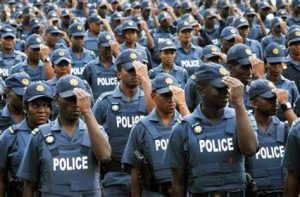
Umm Muhammed Umar
The South African Police Service is facing massive civil claims amounting to 16 billion Rand, that, at the end of the day, will have to be paid for by the taxpayers. The SAPS’s Annual Report tabled in Parliament indicates that a total of 52 203 claims were still pending at the end of March this year. According to SAPS there were more than 10 000 lawsuits filed against the police for unlawful arrest and detention and police brutality. SAPS paid more than 367 million Rand in civil claims in comparison to the 239 million Rand paid out in the previous financial year.
Speaking to Radio Islam, criminologist and police expert, Dr Simon Howell, said he was not surprised by the massive claims against the SAPS. He said, “The civil claims against them have been very large for many years, and I’m trying to think when the last time was that it was below a million Rand.” He said, “It’s always been a lot of money. This year is slightly higher than normal, but I mean, equally, it’s nothing of a surprise, especially the way that policing was conducted at times in this country.”
Dr Simon Howell said that if the SAPS spent at least a tenth of the budget that they have for civil claims on training, they could drastically reduce the total amount of claims that were against them. He said that the SAPS had a very militarized understanding of what policing was and as a result a lot of people get hurt and oppose it, and that this was where the civil claims originate from.
While the police have said that they have developed measures to cut down on the number of claims – one of which was to get the police to change their behaviour and thereby avoid unlawful actions – Howell said that there was almost an organizational culture that was embedded in SAPS itself, and could not simply be changed overnight. He added that it would take a lot of training and a lot of like different management styles to begin to make a marked difference. He said, “they have been trying, to their credit, it’s just a question of how much and how willing people are to change.”
Howell said that South African society tends to look towards the police to deal with all kinds of issues that have nothing to do with policing. He said that the police are often seen as the first go to point for engaging with the government, and as a result a lot of police end up doing a lot that they’re not trained to do. He added that this was frustrating to the officers, both in the way in which public engaged with them but also with the trauma and on the job violence that they experience. There is very little recourse or therapy available to SAPS members, and this does affect the way in which the police engaged with the public in general. Howell said, “the way in which the public engages with SAPS, and the way in which they, in turn, engage with the public, ultimately generates a lot of violence.”
A very significant issue highlighted by Howell was that SAPS had a very hierarchical structure, therefore, having a strong leadership was vitally important. With regard to Police Commissioner, Kehla Sithole, being investigated for corruption, and Police Minister, Bekhi Cele and Sithole being involved in their own feud, he said, “so long as the top leaders are in trouble or are being investigated for corruption, that undermines the higher organizational structure and leadership, and the system itself within SAPS.”







0 Comments